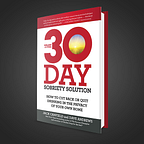Willpower is often considered one of the greatest predictors of individual success, and a muscle we’re commonly told we need to exercise and flex. But for those looking to make a major lifestyle change, like break a bad habit, willpower can actually work against you.
In my work with problem drinkers I see strong willpower keep people from thriving in sobriety constantly. Why? Those with the strongest willpower are often the most able to hide their problem. They’re powerful enough to cause change temporarily, effectively “proving” to themselves that they have control over their choice. Before too long though, they revert to their bad habits.
The truth is, even for the strongest-willed among us, when we are trying to change bad habits willpower alone will always fail over time. Willpower can initiate short-term changes, but as you become further removed from the reason driving you to change, your motivation for changing will fade. Let’s look at an example I use for my sobriety-seekers.
Imagine you wake up to a severe hangover and a call from your doctor saying your blood work indicates signs of liver damage. At that moment you may have tremendous willpower to change. Most of us do when suffering through a crippling headache and fatigue. But the further you are removed from the hangover, say, by next Friday, the more you forget about your painful experiences while drinking, replacing them with thoughts about all the fun ‘drinking’ events you don’t want to miss out on over the weekend. Then, at the end of a long week or in particularly stressful times when decision fatigue crops up, you’ll find yourself saying “I’m healthy, I can drink”, and not have the strength to correct yourself.
This begs the question, if willpower alone isn’t enough what can you do? You have to change at a deeper and more fundamental level. In our experience, people who appear to have incredible willpower appear that way only because they have set themselves up on the inside for success. The 30-Day Sobriety Solution was written entirely for this purpose. My co-author Jack Canfield and I realized that it’s not enough to fight cravings for the rest of your life, you have to do the work that changes your attitude about what you crave so you no longer crave it.
Your change should not feel like a sacrifice or a curse; rather, it should simply be a choice you make because it is what you want. I counsel clients to:
- Discover their core values — When you let your life be guided and directed by your values, you feel happy and fulfilled.
- Acknowledge their life purpose — When you understand what you are here to do, cutting back and quitting drinking comes much more easily.
- Create a Vision Statement — Using your values and purpose, where do you see yourself? What do you really want to be?
But there is one handy trick you can get started on now. We call it a “movie moment.” Think of yourself in the audience watching the movie of your life, what would you yell at yourself? What would you change?
Remember what Freud taught us: the motive behind all of our actions, even our negative habits, is to gain pleasure or avoid pain. The problem is that our perspective often isn’t as clear as it should be. Having a “movie moment” will begin to show you what you need to change and how your actions can rob you of your happy ending. It’s a good start, but the rest of the internal work around exploring your goals, purpose, and values still needs to be done. It’s that work that will show what you really want and rewire your brain to take actions that align with your values.
